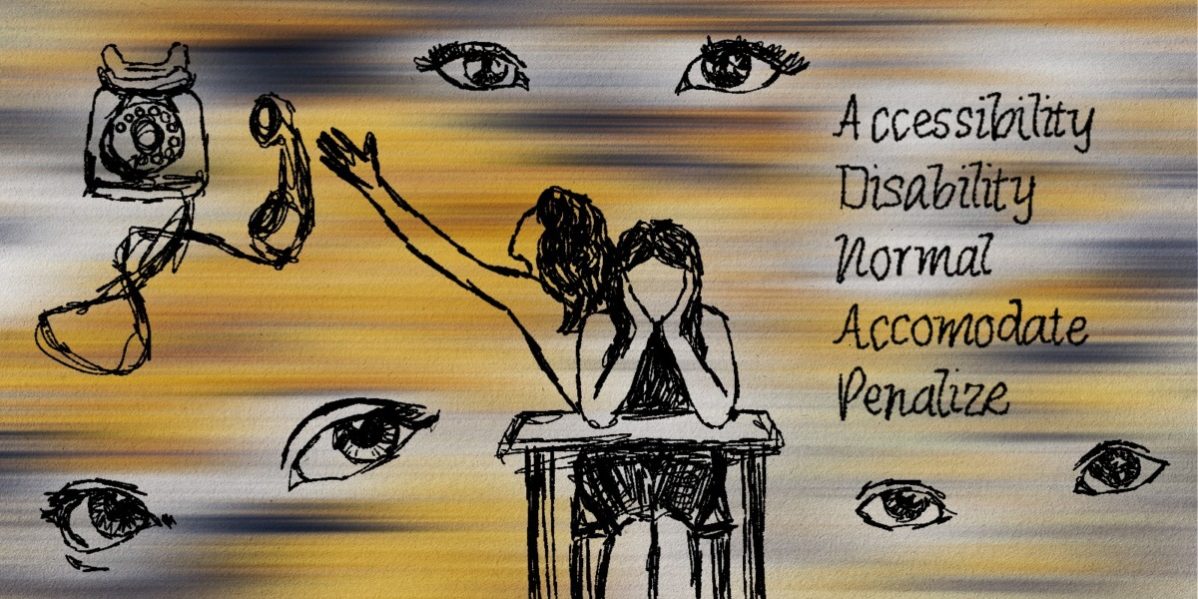Illustration by Katie Doyle
My impression of how George Brown treats its students with disabilities was spoiled before I even handed in my paperwork or spoke to a counsellor.
The language that an institution uses often allows you to glean how much effort has gone into making students who are in a minority group feel included, and the words “Disability Services” made me a little uncomfortable.
Sure, many of us have reclaimed the term and are comfortable with being called “disabled.” But for individuals like me, who still present as a “normal” student outwardly may struggle with referring to themselves as such. The University of Toronto, where I obtained my undergraduate degree, got around this by referring to themselves as “Accessibility Services.” A simple change in terminology shifts the focus from the limitations of one’s disabilities to how students with varying needs can be accommodated.
Not only was it inclusive for people like me, but it took into account students who required temporary accommodations too – say, when a student broke their arm and needed a scribe. It made it so much easier for students to come forward when they needed help instead of trying to gauge whether they were “disabled enough” to merit it.
Late into my first term at GBC, I opted to take an exam that would allow me to be exempt from taking an English class. When my test date was set and I requested accommodations, I was told that I had to make my own arrangements with the Assessment Centre. I wasn’t given any instructions or guidance as to how I was supposed to do this.
So ensued the chaos of running around anxiously trying to figure out the right person to talk to, from my homebase at the Waterfront campus to the English department, when I was finally directed to someone at the St. James Assessment Centre.
It was physically and mentally exhausting.
In my now two and a half years at GBC, I have never made use of my accommodations to write my regular tests and exams at the Assessment Centre.
I was informed at my very first test that if I wrote my exam separately from my class at the Assessment Centre, I’d have to sacrifice being able to ask my professors questions. I would not be able to hear from my professors if they had any corrections to the test either.
Some of my professors compensated for this by allowing me extra time, and letting me sit at the back of the room where it was quiet when I opted to take my exams in class.
My alma mater had a phone that could be used to get in touch with a professor in case of questions or corrections, so it made no sense to me that I was being seemingly penalized for wanting to use my accommodations.
I’m not alone in my frustrations with the college.
I have heard of extensions on assignments being denied despite very legitimate health concerns.
Students with hearing loss have been struggling to keep up with online learning. As a professor’s face is not always visible when a PowerPoint is on-screen in lecture, students are unable to rely on lipreading. And while live captioners are present during the lecture, closed captioning is not available in recordings after the fact.
These are only a handful of complaints I’ve heard from classmates in my program alone.
One of the things I noticed at UofT’s Accessibility Services was the staffing was made up of individuals like me, primarily students and alumni who have needed accommodations in the past. As such, employees naturally understood the importance of crisis training, of speaking emphatically to students, or of simply checking in to make sure students didn’t fall through the cracks. That does not seem to be the case here at GBC.
The university I went to wasn’t perfect by any means, but I think that our college can learn a lot from the way their system works. The disparity between how I was treated there as opposed to here at GBC speaks to the need for all staff, whether it be professors or those at the Assessment Centre, to be further educated on how they can best and most effectively support students who need accommodations.
Ultimately, it is up to the college to set the tone for faculty to follow suit.


